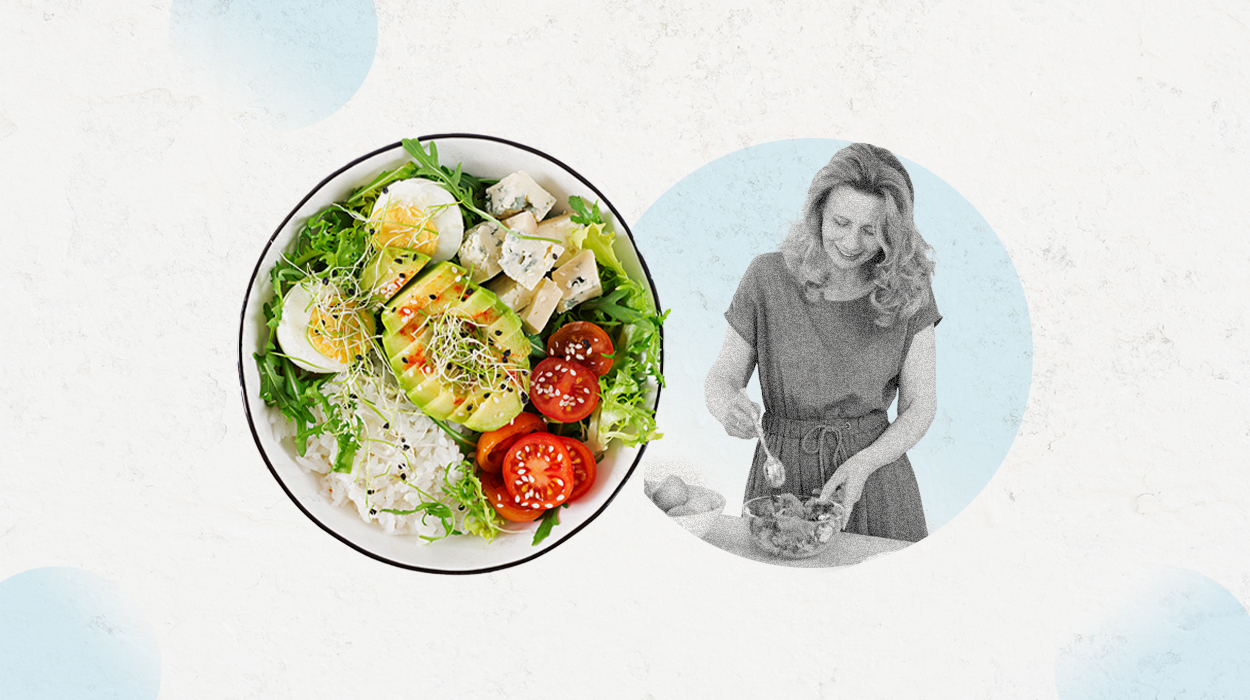 Expert's opinion
Expert's opinion
Expert's opinion
The article is a subjective view on this topic written by writers specializing in medical writing.
It may reflect on a personal journey surrounding struggles with an illness or medical condition, involve product comparisons, diet considerations, or other health-related opinions.
Although the view is entirely that of the writer, it is based on academic experiences and scientific research they have conducted; it is fact-checked by a team of degreed medical experts, and validated by sources attached to the article.
The numbers in parenthesis (1,2,3) will take you to clickable links to related scientific papers.
Keto For Women Over 50 2024: Things You Should Know

Imagine a diet that lets you indulge in healthy fats, shed pounds, and boost energy. Consider the ketogenic diet, a low-carb, high-fat eating plan that has taken the health scene by storm.
The keto diet is a scientifically-backed approach to weight loss and overall well-being. By reducing carbs and increasing fat intake, the body enters ketosis[1], burning fat for fuel instead of glucose. Apart from losing weight, this diet offers benefits that should interest anyone worried about their health as they grow older.
Today, we will focus on women over 50, a demographic group often overlooked in the keto conversation. Hormonal changes, slower metabolism, and specific health considerations come into play when making health decisions. This article delves into the unique considerations and benefits of keto for women over 50, offering insights and tips for a healthier lifestyle.
Keto Diet For Women Over 50
Keto diets benefit women over 50 in many ways. Today, we will focus on the following:
- General pros and cons of the keto diet.
- Specific benefits for diabetes, body composition, energy levels, brain health, and arthritis.
- Tips to balance the diet, manage stress, and improve sleep.
- Recommended keto-friendly foods and the best protein powder women should consider from the keto diet foods list.
Should Women Over 50 Go, Keto?

Our metabolism changes as we get older.
Understanding what happens in the body will help you decide if a keto diet is right for you. The main source of energy the body uses is glucose which we get primarily from the metabolism of carbohydrates such as bread, pasta, certain fruits, and starchy vegetables. When you use a low-carb diet the liver burns fat to make ketone bodies[2] as an alternate energy source to glucose.
Is the keto diet safe? Does the keto over 50 work? The answer is not simply yes or no. We must consider the individual situation of each person to decide.
Keto For Women Over 50: Pros & Cons
Pros
Ketogenic-friendly foods are associated with many benefits that would interest women over 50. A review[1] of the potential health benefits list the following:
- Weight loss: The keto diet helps reduce appetite, burn body fat, lose weight, maintain muscle mass[3], and improve resting metabolism.
- Microbiome: Keto-friendly meals often promote better bacteria in your gastrointestinal tract, improve digestion, increase nutrient intake, improve control of insulin, and even reduce inflammation and help arthritis.
- Diabetes: Studies showed reduced HbA1c levels, reduced insulin requirements, reversed insulin resistance, and increased blood sugar control.
- Heart health: The keto diet and selecting foods with healthy fats improve cholesterol through lower triglycerides and LDLs with increased HDLs.
- Cancer: Studies suggest improved cell health and antioxidant[4] effects from ketones. Cancer cells have a considerable demand for glucose and the keto diet denies them the energy they need.
- Brain health: Studies[5] linked ketogenic diets with increased BHB, ATP, and GABA– chemicals used for brain signals, benefitting brain health and helping to manage diseases such as epilepsy[6]. One animal study[7] shows that a keto diet may help with cognition in Alzheimer’s and needs further research.
Cons
Problems can arise with any diet change.
Side effects[8] may include:
- Flu-like symptoms (referred to as “keto flu”)
- Upset stomach, nausea, and vomiting
- Headache
- Fatigue
- Dizziness
- Low exercise tolerance
- Constipation
- Sugar cravings
Many of these symptoms resolve after a few days or weeks as the body adjusts to the new diet.
The keto diet has a few contraindications[9] and it is not recommended to use the keto diet if you have certain liver conditions, chronic kidney disease, are pregnant, have certain heart conditions, or have severe breathing problems.
In the long term, you will have an increased risk of kidney stones and vitamin deficiencies. It is very important to make sure you don’t get too much or too little of any vitamin or mineral.
Things To Consider
Lose weight while managing your blood sugar.
- Use extreme caution if you have diabetes. You need to monitor your blood glucose levels constantly. Some drugs may not be compatible with the diet.
- Science is evolving rapidly. You may have a condition that recommends against a keto diet but only because it requires careful and frequent monitoring from a doctor.
- Lower levels of some hormones have been shown with a keto diet One study[8] analyzed the effects of a low-carbohydrate ketogenic diet after two months and found that several hormones such as testosterone, insulin, and luteinizing hormone were lower. It is important to coordinate with a healthcare professional to decide if the keto diet is compatible with your current health.
Tips To Follow A Ketogenic Diet When You’re Over 50
Along with reviewing the pros and cons of the diet, here are some recommendations to keep in mind:
Do Not Skimp On Protein
Depending on your lifestyle you will need to personalize your choices. You may need extra protein with your exercise routine. As a word of caution, people with kidney disease[10] might not tolerate much protein and should consult a doctor before changing their diet.
A balanced diet is always important and choosing the right protein can help get the right nutrients you need. Proteins[11] play an important role in making you feel full too. A realistic amount of protein to aim for in your diet is about 10% to 35% of your total calories for the day.
Consider the following when choosing your protein sources:
- Meat: Opt for lean cuts such as chicken or turkey instead of meats with lots of excess fat such as beef or lamb.
- Fish and seafood: They are rich in omega-3 fatty acids which are healthy fats that promote good cholesterol and may help with brain function.
- Eggs: Eggs are a great source of protein and healthy fats. They are very versatile in cooking and can be added to many dishes.
- Powders and drinks: Using a powder can save time with meal prep and give you better control to regulate fat consumption and carbohydrate intake. Choosing the best protein drink for elderly women is important.
- Dairy products: Greek yogurt and some cheeses like cheddar and feta are protein-rich options. However, be careful to look at their carbohydrate content and choose the full-fat or low-carb varieties.
- Nuts and seeds: They contain healthy fats and plenty of protein. It is easy to add them to a meal or carry them for a snack. Almond milk is a great option to mix with a low-carb protein powder.
Manage Stress
The keto diet is one of the harder diets to maintain for the long term. You cut out so many delicious foods and meticulously have to count how many carbs you eat every day. If you are experiencing side effects from the diet such as tiredness you may feel irritable.
You need a way to deal with fighting intense cravings for forbidden food and combat irritability from side effects and adjusting to the keto diet. Just like with any diet, it may take time to adjust to the new lifestyle. Practicing mindfulness and exercising can help deal with stress.
Sleep Well
Choosing the right diet is important.
Good sleep hygiene is important when starting a ketogenic diet. It is an excellent way to manage stress and energy. Your metabolism is changing from the diet and sleeping well can help you feel energetic.
Limit caffeine and avoid alcohol so that they don’t interrupt your sleep. Make sure your diet is balanced so that your body has all it needs.
Avoid stimulation before bed. Try to read a book before sleep rather than using an electronic device. Meditation and journaling are great options that promote mindfulness too.
Conclusion
In conclusion, the keto diet holds many potential benefits for women over 50. It offers advantages such as weight loss, improved microbiome health, better diabetes management, enhanced heart health, and potential benefits for brain health.
However, it is vital to be aware of potential side effects and coordinate with a doctor if you have any disease that needs extra monitoring such as diabetes, liver failure, or various heart diseases.
When following the keto for women over 50, you should prioritize a balanced diet to ensure you get the right amount of nutrients. To manage the changes that come with the diet it is important to manage stress well with good sleep hygiene, exercise, and good self-care techniques.
Ultimately, electing to lose weight using a low-carb diet such as the keto diet requires careful consideration and awareness of the individual health conditions and monitoring required. It is advisable to seek guidance from a healthcare professional to determine if the keto diet is compatible with your specific needs and goals.
+ 11 sources
Health Canal avoids using tertiary references. We have strict sourcing guidelines and rely on peer-reviewed studies, academic researches from medical associations and institutions. To ensure the accuracy of articles in Health Canal, you can read more about the editorial process here
- Dowis, K. and Banga, S. (2021). The Potential Health Benefits of the Ketogenic Diet: A Narrative Review. [online] 13(5), pp.1654–1654. doi:https://doi.org/10.3390/nu13051654.
- Damoon Ashtary-Larky, Bagheri, R., Hoda Bavi, Baker, D., Moro, T., Mancin, L. and Gentil, P. (2021). Ketogenic diets, physical activity and body composition: a review. [online] 127(12), pp.1898–1920. doi:https://doi.org/10.1017/s0007114521002609.
- Gentil, P., Cenci, L., Pier Luigi Pompei, Sahin, N., Bianco, A., Neri, M., Caprio, M. and Moro, T. (2021). Effects of Two Months of Very Low Carbohydrate Ketogenic Diet on Body Composition, Muscle Strength, Muscle Area, and Blood Parameters in Competitive Natural Body Builders. [online] 13(2), pp.374–374. doi:https://doi.org/10.3390/nu13020374.
- Pinto, A., Alessio Bonucci, Maggi, E., Corsi, M. and Businaro, R. (2018). Anti-Oxidant and Anti-Inflammatory Activity of Ketogenic Diet: New Perspectives for Neuroprotection in Alzheimer’s Disease. [online] 7(5), pp.63–63. doi:https://doi.org/10.3390/antiox7050063.
- Pietrzak, D., Kasperek, K., Patryk Rękawek and Iwona Piątkowska-Chmiel (2022). The Therapeutic Role of Ketogenic Diet in Neurological Disorders. [online] 14(9), pp.1952–1952. doi:https://doi.org/10.3390/nu14091952.
- Pereira, L. (2016). Ketogenic diet for epilepsy treatment. [online] 74(10), pp.842–848. doi:https://doi.org/10.1590/0004-282×20160116.
- Yoshihiro Kashiwaya, Bergman, C., Lee, J.-H., Wan, R., King, M., Mughal, M.R., Okun, E., Clarke, K., Mattson, M.P. and Veech, R.L. (2013). A ketone ester diet exhibits anxiolytic and cognition-sparing properties, and lessens amyloid and tau pathologies in a mouse model of Alzheimer’s disease. [online] 34(6), pp.1530–1539. doi:https://doi.org/10.1016/j.neurobiolaging.2012.11.023.
- Batch, J.T., S. Lamsal, Adkins, M., Sultan, S. and Ramirez, M.N. (2020). Advantages and Disadvantages of the Ketogenic Diet: A Review Article. [online] doi:https://doi.org/10.7759/cureus.9639.
- Watanabe, M., Tuccinardi, D., Ernesti, I., Basciani, S., Mariani, S., Genco, A., Manfrini, S., Lubrano, C. and Gnessi, L. (2020). Scientific evidence underlying contraindications to the ketogenic diet: An update. [online] 21(10). doi:https://doi.org/10.1111/obr.13053.
- Moon, J. and Koh, G. (2020). Clinical Evidence and Mechanisms of High-Protein Diet-Induced Weight Loss. [online] 29(3), pp.166–173. doi:https://doi.org/10.7570/jomes20028.
- Cuenca-Sánchez, M., Navas-Carrillo, D. and Orenes-Piñero, E. (2015). Controversies Surrounding High-Protein Diet Intake: Satiating Effect and Kidney and Bone Health. [online] 6(3), pp.260–266. doi:https://doi.org/10.3945/an.114.007716.



